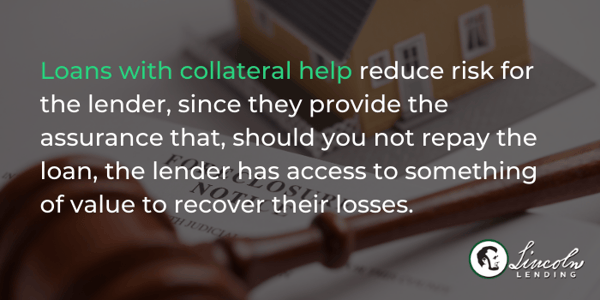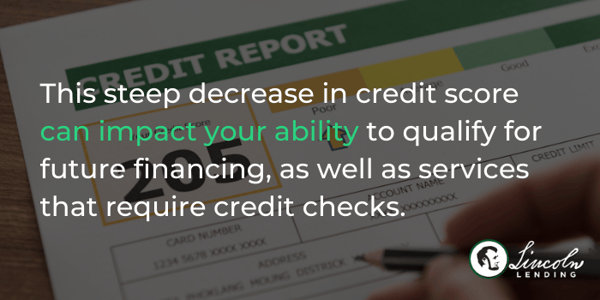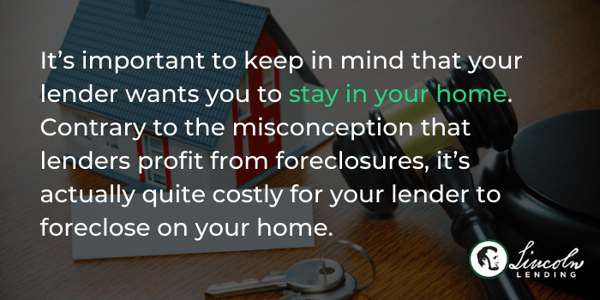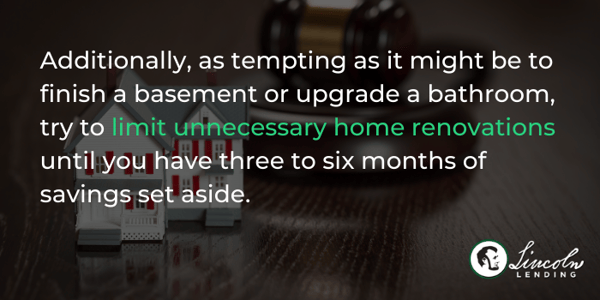Foreclosure occurs when a homeowner fails to repay their mortgage loan as expected, resulting in seizure of the home by the lending institution. While it’s commonly assumed that financial irresponsibility and subprime lending are the primary reasons for foreclosure, the most common causes of foreclosure are actually the death of a spouse, serious illness, and lack of awareness of mortgage terms.
The heartbreak of foreclosure can happen to anyone. In fact, every three months, 250,000 new families enter into foreclosure.
But that doesn’t have to be you.
Even during the hardship of the Covid-19 pandemic, you have access to advice and resources to help prevent foreclosure, protect your credit, and restore your financial security.
Foreclosure 101
Homeownership can be one of the most rewarding investments you can make, bringing with it benefits like increased happiness, higher confidence, and civic engagement. Homeownership is also a significant responsibility and involves a long-term partnership with a lending institution that will last throughout the life of your mortgage.
Typically, the mortgage loan that you accept from your lender is called a loan with collateral. Loans with collateral help reduce risk for the lender, since they provide the assurance that, should you not repay the loan, the lender has access to something of value to recover their losses.

In this case, the object of value is your home.
So, essentially, at the time you sign your mortgage agreement, you promise your lender that they have the right to seize your home if you cannot pay for it.
Once the home has been seized, it will be sold by the bank as a bank-owned, or real estate owned (REO), property, allowing the lender to recoup any losses.
What Causes a Foreclosure?
Every year, millions of Americans fall behind on their mortgage payments without losing their homes. While even a single late mortgage payment can have an impact on your credit, assuming responsibility for late fees and bringing the account up to date will usually allow you to remain in your home.
However, if you can’t bring your outstanding balance up to date and you miss a second mortgage payment, you may unknowingly be on the path to foreclosure. Usually, after two missed payments, a homeowner will receive a “demand letter.” These are often written by a lawyer and, while they can be quite intimidating, most lenders are still willing to work out a strategy for repayment.
After 90 days of non-payment, the situation can become much more serious.
At this point, you may receive a Notice of Default, which may be placed on the front door of the home. While eviction notices follow the same procession, you are not yet being evicted. In fact, most institutions will still welcome your efforts to bring the account up to date.
After 120 days, you will likely be serviced with a Notice of Trustee's sale, which means that your home will soon be sold by the lender to help them recover their financial losses. At this point, unless you are immediately able to remedy the financial issue, there may be little you can do to remain in your home.
Additionally, in many states, once your home is sold to a new owner, the new owner may have the final determination on your eviction date, which may result in your immediate removal from the property.
What Does Foreclosure Do to My Finances?
Foreclosure can have a disastrous impact on your credit score.
While the consequences will depend on several factors, the average homeowner could see a credit impact of 85 to 105 points. Those with excellent credit will absorb the biggest impact, and may see a drop of 140 to 160 points.
This steep decrease in credit score can impact your ability to qualify for future financing, as well as services that require credit checks. Furthermore, while you can rebuild your credit score over time, the foreclosure will remain on your credit report for seven years.

That said, any equity you have built in your home at the time it’s sold in foreclosure will remain yours, minus any foreclosure costs and fees. For a homeowner who began on solid financial ground, only to face hardship after several years in their home, the equity may be enough to assist with a new start.
However, since much of the money from early mortgage payments is allocated to interest, a new homeowner may walk away from a foreclosure with almost nothing.
Can Foreclosure be Stopped?
Yes, it can!
It’s important to keep in mind that your lender wants you to stay in your home. Contrary to the misconception that lenders profit from foreclosures, it’s actually quite costly for your lender to foreclose on your home. The average foreclosure costs a lender $77,935, while preventing a foreclosure costs a lender only $3,300. Clearly, preventing a foreclosure is a much better deal for all parties!

Furthermore, many lenders are locally based. These lenders may know the homeowners, as well as the economic factors involved in their financial struggle. Many lenders, like Lincoln Lending, are connected with their communities and thrive off helping their neighbors be successful and secure in homeownership.
It’s important to understand the position of your lender so that you’re more willing to talk to them about your financial struggles before it’s too late. Together, you may be able to find a solution that helps you remain in your home.
Preventing Foreclosure
There are several steps that you can take to prevent foreclosure, beginning before you ever purchase a home.
First, do your research on the true cost of homeownership. Don’t assume that the mortgage payment will be your only housing expense. The average American spends roughly $2,676 on annual home maintenance and repairs, and another $6,649 on home improvements. You should feel confident that you can cover the cost of your mortgage and yearly expenses without jeopardizing your finances.
Additionally, as tempting as it might be to finish a basement or upgrade a bathroom, try to limit unnecessary home renovations until you have three to six months of savings set aside. While this can be a challenge and may take a couple years to accomplish, it can provide you with the safety net you need to remain in your home during difficult times.

If it is too late and you have already fallen on hard times, remember to talk to your mortgage lender immediately. Participating in an honest conversation with your mortgage servicer, and potentially a HUD-approved housing counselor, can open a variety of options of which you may not have been aware.
Credit counseling, repayment plans, loan modifications, debt consolidation or other types of programs might be available to you, providing you with the relief, and the plan, you need to stay in your home.
It can be embarrassing to ask for help, but the sooner you begin communicating with your lender, such as immediately after a job loss, the more options you will have available. Once you find yourself 120 days delinquent in the repayment of your mortgage, it may be too late to prevent the seizure and sale of your home.
Lastly, avoid mortgage rescue scams! These predatory businesses use public records to identify individuals in financial trouble and offer to “assist” them with avoiding foreclosure. Whether they trick you into paying for information your lender would have provided for free or ask you to sign over interest in your home, these individuals do not have your best interest at heart. Their tactics will only worsen your financial situation and will not protect your home.
Don’t Lose Hope
No matter why you’ve fallen on hard times, don’t lose hope.
Although there’s no quick fix for mortgage delinquency or foreclosure, with the assistance of your mortgage lender, you can find access to the guidance you need to protect your home, credit, and well-being, from the impact of financial uncertainty.
If you have questions about your current mortgage or your mortgage readiness, schedule a Home Loan Coaching Session with a Lincoln mortgage pro today.
